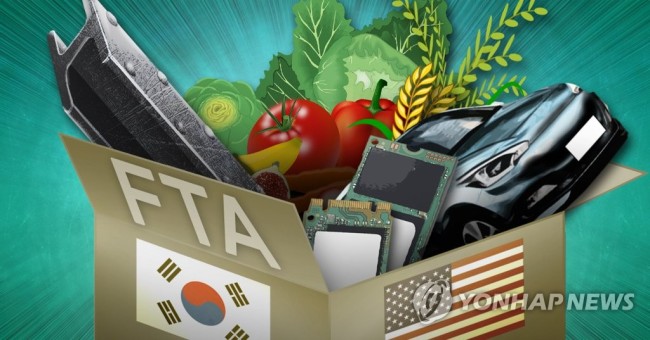South Korea and the United States are to start the first round of negotiations to amend their bilateral Free Trade Agreement on Jan. 5 in Washington, Seoul’s Trade Ministry said Wednesday.
The move to revise the 5-year-old trade deal, triggered upon US President Donald Trump’s request, is expected to raise differences between the two countries regarding their stances toward the automobile and agricultural and livestock goods sectors.
“During the forthcoming negotiations, we plan to push for the inclusion of our issues of interest, seeking to enhance mutual reciprocity and to achieve a balance of interests,” the Ministry of Trade, Industry and Energy said in a statement.
 |
(Yonhap) |
Leading the talks will be Yoo Myung-hee, director general of the ministry’s trade policy bureau, and US Assistant Trade Representative Michael Beeman.
One of the key issues on the negotiating table is Washington’s push to further alleviate trade barriers for US automakers in the South Korean market.
Under his slogan “America First,” President Trump has repeatedly blamed the Korea-US trade deal for causing deficits to US companies and workers, placing focus on automobiles, auto parts and agricultural and livestock products.
Seoul has refuted the accusation, citing macroeconomic factors and the US trade surplus over the past years, but agreed to the renegotiation.
“The US will concentrate on removing nontariff market barriers for automobiles,” the Trade Ministry said in its recent report to the National Assembly.
The pressure from Washington is likely to weigh down South Korean automakers, which have faced sluggish sales in the Chinese market this year, due to Beijing’s economic retaliation against Seoul’s decision to deploy a missile defense system here.
Another point of dispute is whether Seoul will agree to lift exceptions provisions for sensitive products such as rice.
During a special joint session held in Seoul in August, the US team demanded that agricultural tariffs be eliminated right away, which would reverse the bilateral agreement five years ago to exclude rice from the nontariff group and to grant a 15-year grace period for 118 designated items.
Responding to local farmers’ opposition toward opening the market, Seoul has vowed to safeguard its agricultural sector, referring to it as a “red line” in the renegotiation process.
According to the Korea Rural Economic Institute, Korea’s trade deficit with the US in the agricultural sector has risen by $750 million since the FTA took effect, marking a contrast to Trump’s assertion.
By Bae Hyun-jung (
tellme@heraldcorp.com)








![[Weekender] Korea's traditional sauce culture gains global recognition](http://res.heraldm.com/phpwas/restmb_idxmake.php?idx=644&simg=/content/image/2024/11/21/20241121050153_0.jpg)